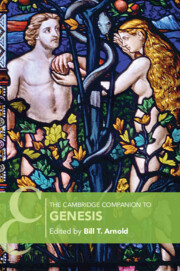Book contents
- The Cambridge Companion to Genesis
- Cambridge Companions to Religion
- The Cambridge Companion to Genesis
- Copyright page
- Contents
- Abbreviations
- Contributors
- 1 Introduction: Genesis and the status quaestionis
- Part I Composition and Structure of Genesis
- Part II Social World of Genesis
- Part III Themes and Literary Motifs of Genesis
- Part IV Reception History of Genesis
- Scripture Index
- Subject Index
- Cambridge Companions to Religion (continued from page iii)
- References
Part IV - Reception History of Genesis
Published online by Cambridge University Press: 02 June 2022
- The Cambridge Companion to Genesis
- Cambridge Companions to Religion
- The Cambridge Companion to Genesis
- Copyright page
- Contents
- Abbreviations
- Contributors
- 1 Introduction: Genesis and the status quaestionis
- Part I Composition and Structure of Genesis
- Part II Social World of Genesis
- Part III Themes and Literary Motifs of Genesis
- Part IV Reception History of Genesis
- Scripture Index
- Subject Index
- Cambridge Companions to Religion (continued from page iii)
- References
Summary

- Type
- Chapter
- Information
- The Cambridge Companion to Genesis , pp. 301 - 360Publisher: Cambridge University PressPrint publication year: 2022

